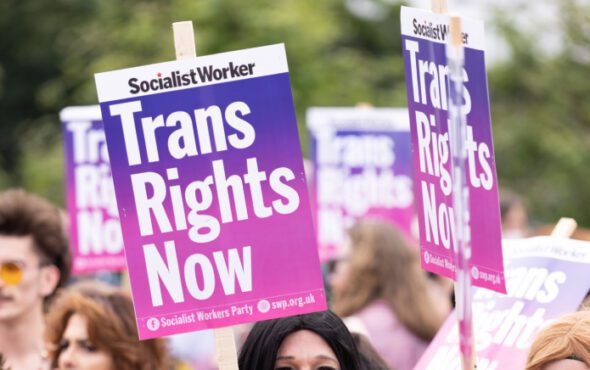
Following a debate in the House of Lords, a “cruel” amendment attempting to change how trans people are imprisoned was withdrawn.
Put forward by Lord Blencathra, a Conservative Party life peer and former MP, his suggested changes would have made whether or not someone had a gender recognition certificate irrelevant when it comes to the prison they are placed in.
According to Lord Blencathra, trans people who “should not be accommodated with prisoners of the same sex as registered at birth, separate accommodation must be provided to ensure that there is no access to or association with prisoners of the opposite sex as registered at birth.”
Referencing an earlier amendment he had attempted to make to the Gender Recognition Act, the 68-year-old acknowledged that it was “unbalanced” as he “neglected to account for the small minority of trans women who might face unacceptable risk if housed in male prisons.”
During his debate, the Lord suggested that if trans women “cannot be housed safely in either the general population of the male estate or with other males in a vulnerable prisoners unit, the decision can be made to house that prisoner in a specialist transgender unit.”
Lord Cormack, who is also a former Tory MP and life peer, said he was “very glad” to support the amendment after being moved by Lord Blencathra’s “convincing and passionate speech.”
“I believe very strongly, as does my noble friend Lord Blencathra, that the solution is to treat those who are particularly vulnerable in such a way that we take as many safeguards against their vulnerability as possible,” the 82-year-old explained. “To me, that leads logically to a solution where those who were born as women, and who are women, are in women’s prisons, and those who are still physically male are, if necessary, housed in a separate unit.”
Also supporting the change was Baroness Fox of Buckley, another life peer and ex-Tory MP, who praised Lord Blencathra “for doggedly sticking with this issue.”
Citing tweets from the #KeepPrisonsSingleSex hashtag, the Baroness called the changes a “modest proposal” generating “a huge amount of interest outside this place”.
“I know that some noble Lords may be feeling uncomfortable that I am using the word ‘male’ to describe transgender women—such is the muddle that we have got into in conflating sex and gender,” the 61-year-old told her peers. “I was doing that to emphasise their sex, rather than to be offensive or cause any problems, but such is the weight of coercive control and political pressure around identity politics that it can be difficult sometimes to state biological truth—and the biological truth is that sex and gender are distinct.”
Another Conservative Party life peer supporting the amendment was Baroness Meyer, who clarified “that we are talking only about men who have not transitioned to women, which is quite different.”
Lord Pannick, a crossbencher in the House of Lords, called the proposed changes “enormously dangerous” and said that he stood against the “puzzling” amendment.
“What it would mean is that even if a person born male has lived as a woman for 20 years, even if they have undergone sex reassignment surgery, even if they have a gender recognition certificate, and even if they are assessed as posing no risk whatever to other women, the Home Office would be obliged either to place them in a men’s prison or put them in specially segregated facilities,” he explained.
Similarly, Lord Hope of Craighead, a retired Scottish judge and former Convenor of the Crossbench peers, criticised the “cruel” amendment.
Last night in the @UKHouseofLords I spoke in support of transgender people’s rights.
I also spoke to protect women & girls.
I voted for a statutory inquiry into the issues surrounding Sarah Everard.No one who spoke against trans rights voted to protect women & girls. No one.
— Brian Paddick (@brianpaddick) January 11, 2022
The 83-year-old added: “It is quite striking if you look at the wording of the amendment—it makes no distinction between whether we are talking about male or female prisoners, but very different situations arise depending on which of these Toggle showing location of characteristics you are considering.
“It makes no distinction for the time that the person may have lived in that new assignment.
“It makes no distinction, either, for the extent of the surgery and the appearance of the person over time as the reassignment process takes place.”
Lord Michael Cashman, LGBTQ+ rights activist and former special envoy on LGBT issues worldwide for the Labour Party, stated that the current system in place is fine as it is.
“We are being asked to deal with fears on both sides of this argument, and I want us to deal with both equally,” the 71-year-old commented. “The balancing of rights always poses for us the greatest problem, but I believe that the Ministry of Justice, in its policy on assessing trans prisoners, has got it absolutely right.”
Lord Faulks, an unaffiliated peer and current Chairman of the Independent Press Standards Organisation (IPSO), said the process “requires assessment and nuance.”
He continued: “The noble Lord, Lord Pannick, referred to those who had lived for 20 or 30 years in their acquired gender.
“I am afraid this amendment would deal with that sort of situation.
“I know that it is well meant and it acknowledges the difficulties, but I suggest that to legislate in this area would be extremely inappropriate.”
Speaking “as a woman who cares deeply about the physical safety of women,” Baroness Barker, a Liberal Democrat member of the House of Lords, argued that the current policy “does protect to the full the human rights of individuals, but also balances them with the safety of everybody—that includes the staff in prisons as well; let us not forget them.”
Rounding out the debate, Lord Blencathra acknowledged that he was “not going to be successful” in amending the bill.
He stated: “I am not going to be successful today, but I say to all my noble friends on the Front Bench, in all departments, that this policy of downgrading the rights of biological sex women is heading for the scrapheap of history.
“It is not on the side of science, logic, morality or common sense, and everyone outside the political bubble we are in knows that.”
Proceeding to withdraw his amendment, Lord Blencathra said he did so “not because I am wrong but because I cannot win in the numbers tonight.”
The Trans Legal Projected celebrated the amendment’s defeat in a series of tweets on 11 January.
“Delighted that yet another attack on human rights of trans people has been defeated in the Lords tonight,” the account wrote. “Lord Blencathra’s 2nd attempt to introduce a stipulation that ALL trans people, irrespective of their crime, transition history, legal gender status or risk to others, be categorically denied the right to be housed in the prison matching their acquired gender has failed. The government’s case-by-case approach on this works & prison governors agree.”
1/3 Delighted that yet another attack on human rights of trans people has been defeated in the Lords tonight. Lord Blencathra's 2nd attempt to introduce a stipulation that ALL trans people, irrespective of their crime, transition history, legal gender status…
— Trans Legal Project (@TransLegalProj) January 10, 2022



